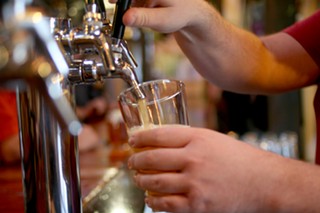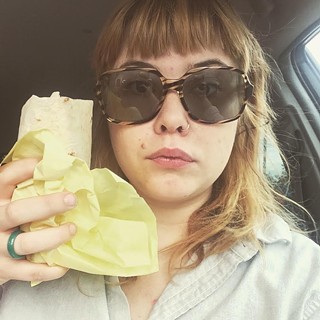My fellow beer enthusiasts, it has been quite a wild past few years in the world of craft beer in Tucson. From inventive ingredients to collaborative concoctions, brewers in the Old Pueblo are proving they have what it takes to keep up with international beer trends. Now, at the precipice of the fifth annual Arizona Beer Week, it's time to look at where craft beer started, where it's going and some of the hurdles the industry will have to overcome to get there.
THREE YEARS OF BEER
It's crazy to think that just five years ago there were only three craft brewers (Gentle Ben's and Barrio operate under the same owner) in the city. However, that changed quickly when two sets of hobbyist homebrewers, one father-son team and another pair of kickball buddies began turning their basement operations into full-blown production facilities.
In December 2011, it became obvious that the Tucson craft beer movement was about to really gain momentum with the opening of Borderlands Brewing Co. True, Nimbus, Thunder Canyon, and Barrio were all brewing before this point in the city, but it does seem that their opening was the beginning of a brewing explosion in Tucson.
Originally, Mike Mallozzi came to Tucson from a quality assurance gig at Budweiser's Colorado facility. With a PhD in microbiology, Mallozzi took a research position at UA and happened to meet future business partner Myles Stone while playing kickball. The two quickly discovered that they shared a passion for homebrewing.
"We decided to start something pretty much immediately after that first batch we brewed together," Mallozzi says.
About four months later, Dragoon Brewing Co. began brewing professionally, too after father Bruce Greene blended years and years of homebrewing experience with his son Eric's beer judge certification.
Between talking to the two men about their role in the beer community, Greene asked me to say hi to Mallozzi for him when I saw him, and that, for Mallozzi, is what really sets Tucson's craft beer scene apart from all of the rest.
"The brewing community in Tucson is really tight. We all meet monthly as part of the Baja Arizona Brewers," Mallozzi says. "We really all support each other."
WHAT'S BREWING NOW
Since Dragoon's birth, six more breweries began brewing and serving beer in Tucson and a few more are on the way. On top of that, several more craft beer bars have opened and most local restaurants wouldn't be caught dead without some craft local drafts on tap. Greene says concentrated measures like the Drink Local campaign in grocery stores and gas stations help reinforce local beer's place in the state.
"In the end, the only reason it's there is because people want it," Greene says.
Mallozzi agrees, saying, "People demand it. If you're going to claim to be a foodie restaurant, you have to have [craft beer] now."
That demand has taken both Mallozzi and Greene's product in some unexpected places. Seeing his craft beer in well-loved dive bars, such as the Golden Nugget, is really a sign of the market's persistence, endurance and competitive viability in the beer industry against giants like Bud and Coors.
From 2013 to 2014 alone, Dragoon saw a 64 percent production increase from 49,600 gallons to 77,500 gallons, but it isn't just about the numbers for Greene.
"I absolutely think we compete on the creativity spectrum," Greene says. "I've seen what people are doing internationally and I think here in Tucson we learn from them but we're also keeping up."
Even newer brewers on the market are able to find success in the growing industry. Sentinel Peak Brewing Co., which celebrated a one-year anniversary last month, stayed pretty consistently sold out for the first few days that their taproom was operational. Since Sentinel Peak's opening in January 2014, two more breweries, Iron John's and Pueblo Vida, have also began pouring pints. There are still more rumors of breweries like Public Brewhouse and Corbett Brewing Co. entering the market in the near future as well.
A TALE OF TWO BEER BILLS
With all of that growth, you have to imagine there might be some growing pains as well. That becomes a pretty massive understatement when you consider the fact that liquor laws have stayed relatively the same from Prohibition until a decade or so ago.
That means every growler you see proudly displayed on brewhouse shelves was fought for with legislation full of convoluted legalese. Every locally distilled spirit, every bottle of wine from Sonoita, and every brewpub space has faced barriers as outdated laws began to butt up against new tastes and a burgeoning small-batch beer, wine and liquor industry.
With a win last year for growler legislation, craft beer producers in the state are hoping for another victory on reestablishing cap limits for in-state microbreweries. At the very basic level, Rob Fullmer of the Arizona Craft Brewer's Guild says that is what he's hoping to change with SB1030.
"We're in an industry that you have to ask every couple of years to have laws changed—laws that are arbitrary," Fullmer says.
As it stands now, the state's three-tier system provides that microbrewers are capped at 40,000 barrels (about 1.25 million gallons) of beer but can open brewpubs and restaurants to try to draw new customers in. Producers, on the other hand, can make more beer each year, but can't open those restaurants. As it stands, Four Peaks Brewing Co. in Tempe is brushing up against that distinction and San Tan in Chandler is coming close. However, Eric Greene says there are elements of the bill that will benefit his brewery at its current size.
"Directly it will allow [Dragoon] to serve collaboration brews at other breweries," he says. "It's the ability to showcase another beer. It's not about the bottom line—it's about telling a story."
Since every gallon of beer produced in the state is subject to an excise and luxury tax, in 2012 alone, in-state craft beer contributed to more than a half-million dollars in those taxes on top of nearly $10 million in sales tax, according to the Arizona Department of Liquor. Fullmer argues that limiting the growth of Arizona craft brewers is hindering not only their businesses, but the state's economic growth as well.
"We'll never know the effects of having to play this game the last 10 years or so with Four Peaks," Fullmer says. "It could have grown as large as Stone."
The craft brewers use the Stone Brewing Co. analogy because it opened around the same time as Four Peaks, but, in San Diego, is not subject to the same restrictions as Four Peaks. According to the National University System Institute for Policy Research—a nonpartisan economic research nonprofit—Stone Brewery's facility in Escondido is now the third largest visitor destination in North County with only the San Diego Zoo Safari Park and Legoland gaining more visitors.
Although, according to Fullmer, Arizona-made beer only represents an estimated 2 percent market share in the state and craft beer overall only 10 percent, it does seem that the growing category is of concern to the Arizona Wine and Spirits Wholesale Association, which is opposing SB1030 with their own bill and makes up a part of the third tier: wholesalers.
AWSWA's bill, SB1437, was filed early last week, and, according to the AWSWA's lobbyist Don Isaacson, still quadruples the current cap. Isaacson says anything past that point should require "megabreweries" like Four Peaks to decide if they want to exceed the limit or maintain ownership of their restaurants.
"Four Peaks is bigger than Guinness here," Isaacson says. "Guinness and Sam Adams can't open a restaurant here. It's unfair ... At some point Four Peaks has to choose."
Barrett Marson, a spokesman for AWSWA, says that SB1437 was amended to allow for for those collaborationsdoesn't allow for those collaboration beer crossover events that both Dragoon and Borderlands were looking forward to. Still, Fullmer isn't pleased with the AWSWA's proposed changes.
"They did this without having the courtesy to talk to any member of our guild," he says. "It's the absolute height of arrogance: AWSWA's three mega-sized, multi-state wine and spirit wholesalers—with market valuations of well over $3 billion each—pretending to know what's best for Arizona and our microbrewers."
Fullmer says educating beer enthusiasts and brewers on this process has been a "really good civics lesson," but fears a loss will mean a return to cynicism in the system for those people. He hopes, no matter what happens, that that isn't the case because he says the guild hopes to move on to supporting other local measures that aren't directly related to brewing, such as public transportation and more.
When both bills were presented to the Senate's Commerce and Workforce Development Committee on Monday, Feb. 9, SB1030 went through to the next stage of the bill's review process. With one brewer after another giving two-minute testimony, the support for SB1030 was vocal, to say the very least. Sen. Steve Smith, who sponsored SB1437, chose to hold his bill by the end of the committee hearing—but that's far from the end of the debate.
"This thing isn't going to end until the government signs it sometime in April or May," Fullmer says. "It's going to be a big fight."
A KEG AND A HARD PLACE
Interestingly, this debate has put one of Tucson's bars in a tough spot. Tap & Bottle, which is owned by Rebecca Safford and her husband, opened in June 2013. In that short time, the beer bar and bottle shop has become known for its fantastic selection, offering everything from Denmark's Mikkeller beers to Oregon's Ninkasi to Old Pueblo mainstays like Borderlands.
Pulling in all of those national and international bottles and kegs means going through those wholesalers who oppose the ACBG's version of the bill. However, the couple is also dedicated to local business as members of Craft Tucson, meaning they ultimately decided to voice their support for local brewer's growth by pulling for SB1030.
"To me, I just want breweries to grow how they want in the best way they can," Safford says.
It remains to be seen if Safford's support of the ACBG bill will negatively impact the business, but she's hoping to continue buying up as much Arizona beer from those wholesalers as possible—a win-win in her mind.
A BRIGHT AND BUBBLY FUTURE
Regardless of which bill ultimately passes in the 2015 Beer Bill battle, it's safe to assume that as the industry grows, more issues like this will continue to arise. However, for breweries like Borderlands and Dragoon that anticipate reaching the established caps as part of their 10-year plan, the passage of one of two of those bills will certainly impact on how they move forward.
For now, though, Greene says that he and the Dragoon crew are working on expanding statewide this year and then out of state in the near future. One way they plan on doing this is offering their IPA, which is Arizona's highest-ranking beer on RateBeer.com, in cans by this spring.
"Beer brings people together—it's fun and it makes people happy," Greene says. "Products like this are as much about the product itself as the experience."
















